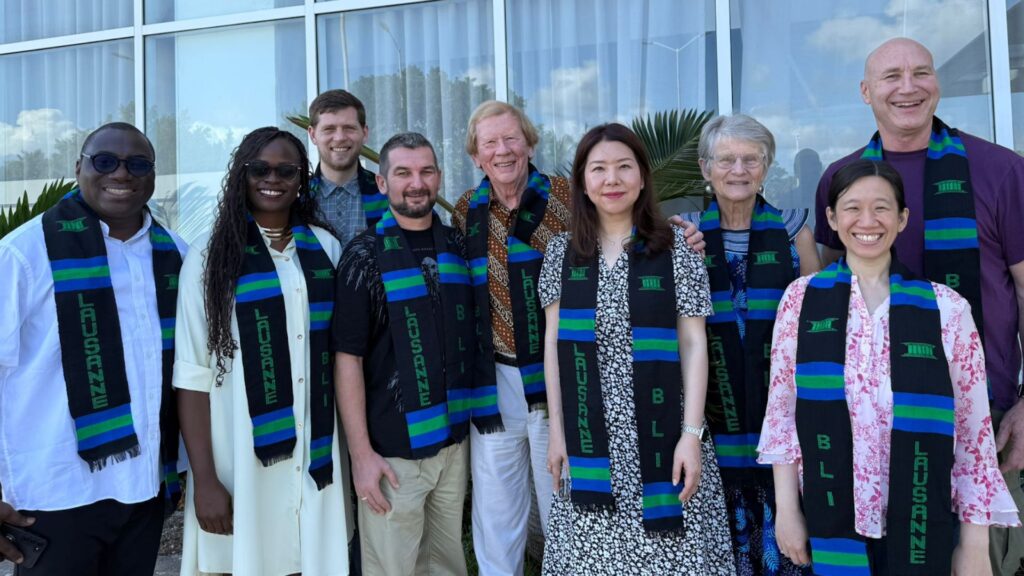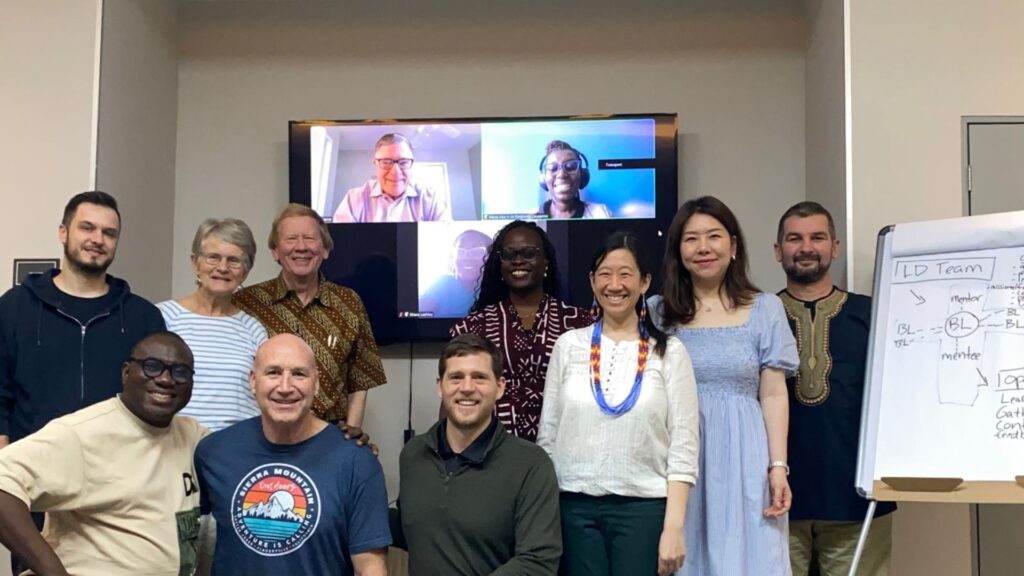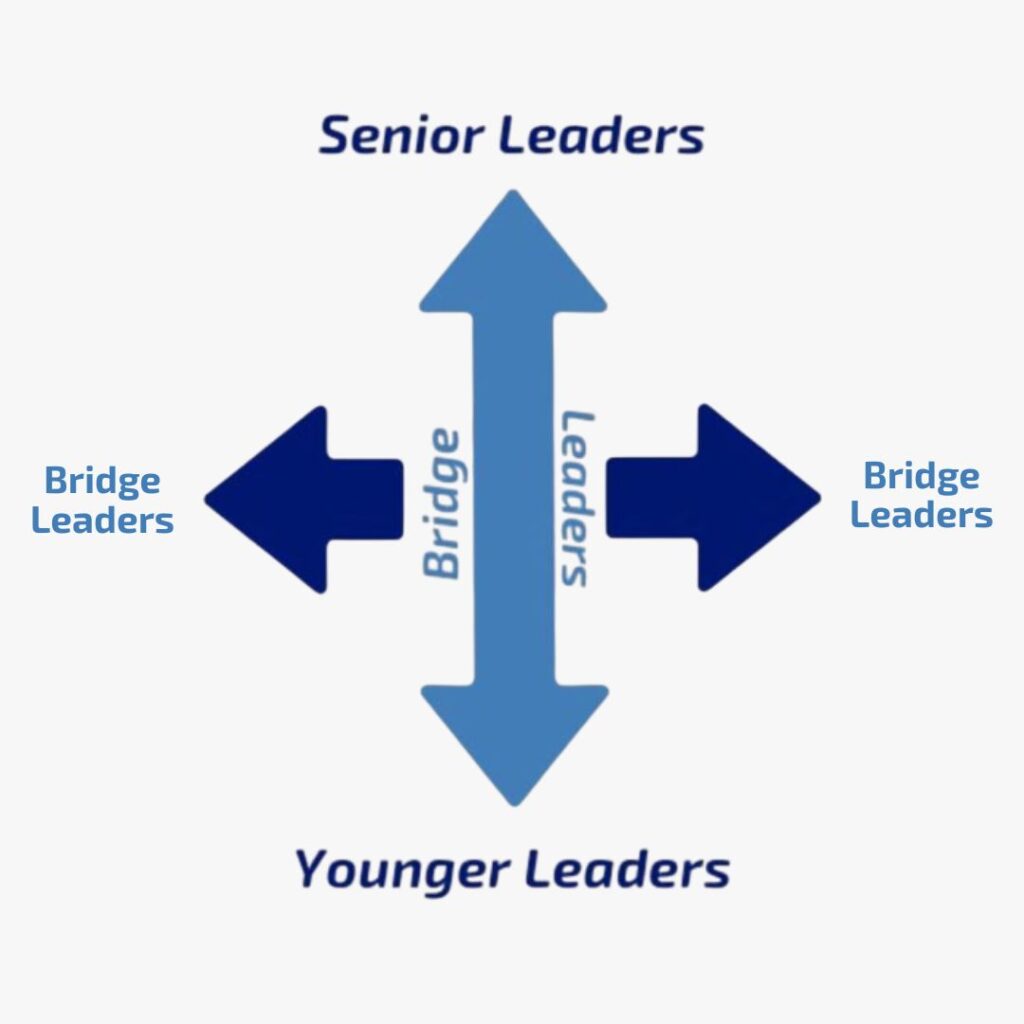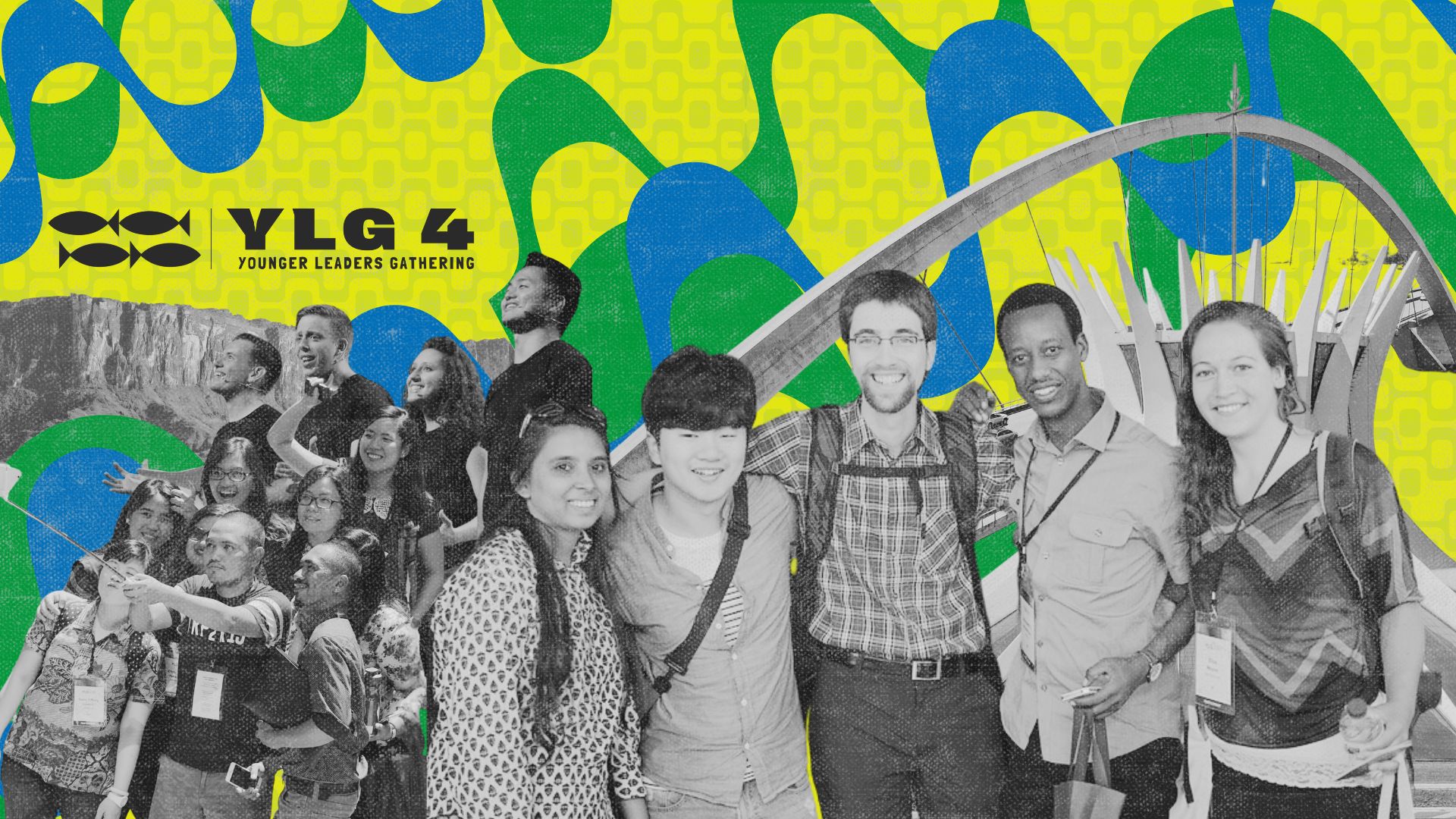For generations, leadership transitions have been challenging. Many young leaders experience seasons of uncertainty, searching for guidance and wisdom, while senior leaders seek to pass on their knowledge and legacy in ways that last. Those in the 35-50 age group—”bridge leaders”—are in an often overlooked but crucial life stage.
They are experienced yet still growing, as many have already held positions of leadership nationally and even globally. This phase of life often leaves leaders at a crossroads in regards to career shifts, family pressures, and significant leadership decisions. Many leaders in this season face burnout, crisis, or stagnation in their calling, making intentional discipleship and mentoring essential—they need good support to finish well.

In every generation, God raises up leaders to carry forward his mission, ensuring that his work continues from one generation to the next. In January 2025, key leaders from across Lausanne gathered in Cancún, Mexico, for a consultative meeting focused on the role of “bridge leaders”—Christian leaders aged 35-50 who are uniquely positioned between younger and senior leaders in global mission. The Lausanne Movement has long been committed to identifying, equipping, and connecting leaders across generations for the sake of the gospel. Now, a new initiative within the Generations Department, called “bridge leaders”, is set to strengthen this intergenerational mission even further.
Biblical Foundations for Bridge Leaders
Beginning with Genesis, God expresses generational thinking in mission, as he reveals his very nature—from everlasting to everlasting, or from generation to generation! Genealogies in Scripture reveal how fathers and mothers bearing God’s likeness were his chosen bridges of mission from one generation to another. In the Gospel of Matthew, God summarises what he has been doing all through scripture by including 42 generations—from Adam to Christ! What is clear, is that each generation needs one another as part of God’s ongoing plan for our lives. Building relationship bridges from one generation to another paves the way for generational success, meaning we think less about ourselves, more about what God is doing, and remain faithful, spurred on by those who have gone before us, and cheering on those coming up behind.
From “burden bearers” to “mid-lifers”, to “mid-careers” to “early quadragenarian”, there seems to be a consensus within society that those within the 35-50 age category are no longer viewed as young. For some within this age bracket, these labels are earth-shuttering, and for others, these labels are worn with pride. What is clear, is that God has a unique missional plan for this generation, not an intervention plan, but a mission that he began before the foundations of the earth! A mission for this to be a “bridging generation”.

The Vision of the Bridge Leaders Initiative
Lausanne’s bridge leaders initiative aims to identify, connect, and encourage current and future Christian leaders aged 35-50, equipping them to serve both within the Movement and the global Church. As leaders who stand between emerging and senior generations, bridge leaders have a unique role in ensuring the continuity and strength of global mission.
This initiative will also strengthen connections among bridge leaders themselves, as well as with senior and younger leaders worldwide. As experienced leaders, many are already serving in national and global leadership roles within churches, businesses, and mission organisations. They bring sharp skills, greater knowledge, and global networks, along with a strong desire to contribute to the Lausanne Movement and global mission. However, this season of leadership comes with unique challenges.
Many bridge leaders face increasing leadership pressures, shifting responsibilities, and the risk of burnout or midlife crises. Without intentional investment, some may develop patterns that hinder long-term faithfulness and effectiveness. Recognising these dynamics, the bridge leaders initiative seeks to provide the support, community, and guidance needed for leaders to thrive, finish well, and shape the future of global leadership.
The goal is to cultivate stronger, healthier global leaders—leaders who engage effectively both locally and globally, strengthening their ministries, the global church, and the Lausanne Movement. Additionally, bridge leaders will play a strategic role in modeling intergenerational leadership, demonstrating how different generations can collaborate effectively in fulfilling the Great Commission.

Key Lessons and Outcomes from The Bridge Leaders Consultation
The Life of a Bridge Leader
Leading One’s Self: The Character of a Leader
A bridge leader should exhibit certain disciplines and character traits essential to Christ-honouring leadership. Just as the depth and strength of its foundation influences the height and size of a building, leadership fruitfulness is also determined by the hidden parts of a leader’s personal life. Dr. Eugene Habecker and David Cooke are senior leaders who shared extensively on the foundation blocks essential to healthy leadership during the ‘bridge leader’ stage of life. They believe that integrating sacred disciplines into daily life to deepen intimacy and friendship with God, fostering trust and accountability, practicing forgiveness, and cultivating self-awareness are essential foundations for bridge leadership.
Leading One’s Family: Healthy Missional Homes
Healthy family life is an aspect of the bridge leader’s life which is considered essential to finishing well as a leader. In Isaiah 32:18 God shares his heart for his people, ‘My people will live in peaceful dwelling places, in secure homes, in undisturbed places of rest.’ However, challenges within family life can significantly impact its health and, in turn, affect the well-being of the leader. As seasoned mentors Kari and Ole-Magnus Olafsrud remarked, the verse, ‘…they made me keeper of the vineyards, but my own vineyard I have not kept!’ (Song of Songs 1:6) resonates with many in the bridge leader stage of life. Therefore, to build healthy missional families, the foundational routines of Silence and Solitude (retreat with God), Sabbath (rest), Simplicity (modest living), and Slowing (the elimination of hurry) ought to be prioritised by bridge leaders.
Additionally, building healthy missional families may require deeper understanding of intergenerational dynamics. The genogram is a helpful tool to understanding the interplay of hereditary and psychological factors affecting the individuals and generational dynamics within the family. Developing intergenerational communities with senior leader families and younger leader families will strengthen bridge leader families in their missional mandate. These missional communities thrive through true friendship, shared experiences, and bible-centered mentors.
Disciple-Making Mentor: Head, Heart, Hands
The bridge leaders initiative will serve as an avenue for shaping a leadership culture of holistic mentoring through effective discipleship. The Christian life revolves around discipleship, which involves being and making disciples. Jesus’ last words before His ascension (Matthew 28:19-20) make it abundantly clear that it takes deeply transformed people—Christ’s disciples—to deeply transform society through discipling the world to obey Christ! Being and making disciples is a transformative process that lasts a lifetime. This process takes place in the head (intimately knowing Jesus), heart (being willing to be used by God) and hands (acquiring and honing mentoring skills).
Missional Friendships: A Core Value of Bridge Leaders
One of the defining elements of the bridge leaders initiative is its commitment to missional friendships. Bridge leaders will be encouraged to form friendship circles of four to six fellow leaders, creating trusted communities of accountability, encouragement, and wisdom. These friendships will provide a support system for navigating leadership challenges while also fostering connections with senior and legacy leaders.
By increasing self-awareness and self-leadership, bridge leaders will be equipped to mentor and uplift one another, ensuring they stay healthy, finish well, and continue accelerating global mission efforts.

Leadership in Action
Country-Level Best Practices: A Glimpse into YLGen Korea
What began as a charge to 1,000 younger leaders at the 2016 Younger Leaders Gathering (YLG) in Jakarta has flourished into a thriving citywide movement in Seoul, South Korea—now expanding across Asia and Europe!
The growth of YLGen Korea has been fueled by deep friendships, intentional relationships, and support from senior leaders. During the COVID-19 pandemic, younger leaders gathered in small groups, providing safe spaces to openly share their joys and struggles in leadership, family, and ministry. While none of them initially sought deep friendships, authentic community naturally formed, becoming what they now value most. Over time, this organic network of friendships has extended beyond Korea, spreading into other regions. Senior leaders in the Korean Lausanne Committee actively affirmed and supported these younger leaders—not just through formal mentorship but by showing up, listening, and even inviting them for shared meals.
Some of the key missional priorities that YLGen Korea have focused on include cities, Church Planting, Christian Research, Media Engagement, Proclamation Evangelism, Campus Lausanne Group, and Ministry Collaboration. These younger leaders now have regular rhythms that include monthly meetings for the core leadership team, friendship gatherings for medium sized groups, and an annual, large, one-day conference that focuses on sharing about the Lausanne Movement in a relatable way. Within these conferences, younger leaders get to share on missional issues and have sessions of panel discussions, as well as worship. Mission agencies and Christian organisations are also welcomed to engage and share about their ministries.
As part of their future focus, they will be undertaking a Collaborative Action vision trip, which will include sharing about prayer, revival and connecting more with other Asian and European countries.
YLG 4: A Strategic Mentoring Opportunity
Bridge Leaders are uniquely positioned to pour into the next generation, serving as disciple-making mentors who intentionally invest in at least one younger leader. Lausanne’s fourth Younger Leaders Gathering (YLG 4) will provide a key opportunity for bridge leaders to invest in younger leaders through mentorship. Particularly those leaders who have journeyed through and benefited from YLGen will now have the opportunity to actively contribute to developing the next generation of mission leaders.
Key Takeaways
Lausanne’s bridge leaders initiative aims to identify, connect, and encourage current and future Christian leaders aged 35-50 in their journey with Lausanne and the global church. The initiative will contribute to Lausanne’s conviction towards intergenerational leadership through:
Friendship Circles – Bridge leaders will form authentic, accountable friendships, creating a supportive community for personal growth, leadership development, and shared mission engagement.
Mentoring Up and Down – Bridge leaders will engage in two mentoring relationships:
- Receiving mentorship from a senior leader.
- Mentoring a younger leader, investing in their spiritual and leadership journey.
Global Community Engagement – Bridge leaders will connect and collaborate through:
- Regular online gatherings
- The Lausanne Action Hub
- Special events and leadership development projects

Active Global Mission Involvement – Bridge leaders will stay informed and engaged with Lausanne’s regional networks and issue networks, discerning where they are called to contribute to closing gaps in global mission.
The Younger Leaders Gathering in 2027 (YLG 4) will form a strategic opportunity for bridge leaders to invest in younger leaders and build relationships that they can pour into.
By identifying, equipping, and connecting Bridge Leaders, Lausanne is strengthening intergenerational leadership for the future of global mission. This initiative is not just about building better leaders—it’s about ensuring that generations work together, equipping one another, and advancing the gospel in unity.


